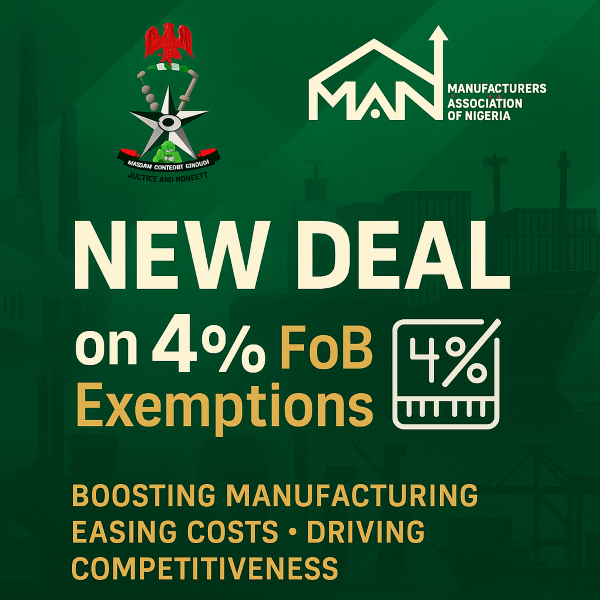How 4% FoB Exemptions Will Ease Costs for Nigerian Manufacturers

In a landmark decision, the Nigeria Customs Service (NCS) and the Manufacturers Association of Nigeria (MAN) have reached a pact to exempt raw materials, spares, and machinery imports from the suspended 4% Free on Board (FoB) levy. The move is designed to cut production costs, ease trade bottlenecks, and re-energise industrial growth at a time when Nigerian manufacturers are battling high input costs and stiff global competition.
A Turning Point for Industrial Policy
Nigeria’s manufacturing sector has long been at the crossroads—struggling with rising energy costs, foreign exchange volatility, and regulatory bottlenecks. The temporary suspension of the controversial 4% FoB levy and the subsequent exemptions agreed upon by Customs and MAN could mark a turning point.
At a consultative meeting in Lagos, Comptroller-General of Customs Bashir Adeniyi and MAN President Francis Meshioye agreed on exemptions, pre-release procedures, and fresh trade facilitation measures. The move reflects government’s dual aim: safeguard Customs revenue while enabling manufacturers to compete and grow.
Adeniyi explained: “The exemptions reflect government’s commitment to protecting critical sectors, especially manufacturing, while maintaining an efficient revenue collection system.”
What the Agreement Covers
- Exempted Imports: Raw materials, machinery, and spare parts covered under Chapters 98 and 99 of the Customs Tariff.
- Pre-Release Authorisation: Eligible manufacturers can apply for pre-release to avoid demurrage costs.
- Future Onboarding: MAN, Customs, and the Ministry of Finance will immediately begin onboarding manufacturers not yet under Chapters 98 and 99.
- Credit for Payments Already Made: Manufacturers that paid the 4% FoB levy before onboarding will have credits applied to future Customs transactions.
- Other Exemptions: Imports tied to government projects with duty exemption certificates, humanitarian/life-saving goods, airline spare parts, and items under the Presidential healthcare value-chain initiative.
Sector-by-Sector Analysis
1. Manufacturing Sector
Manufacturers will see immediate relief in input costs, especially in industries reliant on imported raw materials (chemicals, textiles, plastics, agro-processing). Reduced clearance delays through pre-release authorisations could also save millions lost to demurrage.
Investor Implication: Lower production costs may improve margins for listed manufacturing companies on the NGX, improving earnings outlook and investor sentiment.
2. Aviation Sector
FoB Exemptions for commercial airline spare parts ensure critical maintenance inputs are more affordable, boosting safety and operational reliability.
Investor Implication: Airlines listed on the NGX or privately held will benefit from reduced maintenance costs, possibly translating into lower fares or improved profitability.
3. Healthcare Sector
The Presidential initiative on unlocking the healthcare value chain is bolstered by exemptions on life-saving imports. This reduces costs for hospitals and pharma companies, potentially expanding access.
Investor Implication: Positive outlook for healthcare investments, particularly pharmaceutical manufacturing and medical equipment distribution.
4. Customs & Trade Facilitation
The NCS has committed to technology-driven reforms—developing one-stop shops, cutting bureaucracy, and reducing multiple checkpoints and alerts. This aligns with the Authorised Economic Operator (AEO) scheme.
Investor Implication: Improved ease of doing business could boost Nigeria’s ranking on global trade indices, making the country more attractive for FDI.
5. Industrial Competitiveness
MAN has long argued that levies like the FoB charge fuel high-cost production. By easing these burdens, Nigeria’s industrial products could better compete with imports from Asia and other African economies under AfCFTA.
Investor Implication: Domestic manufacturers could claw back market share from imports, offering upside for local equity investors and strengthening Nigeria’s export competitiveness.
Challenges Still in Play
- Customs Systems: Complaints about multiple alerts and glitches on the B’Odogwu platform persist.
- Policy Consistency: Investors worry about reversals or unclear implementation timelines.
- Infrastructure Costs: Energy and logistics remain the heaviest burdens on manufacturers, limiting the full benefit of exemptions.
BRANDECONOMY Takeaways for Decision-Makers
- Government: Policy clarity is as important as policy generosity. Transparent implementation of exemptions and onboarding procedures will be key to sustaining trust.
- Customs: Must follow through on its pledge to streamline clearance, reduce human interface, and expand technology use.
- Manufacturers: Should proactively onboard under Chapters 98 and 99, track credit notes for paid FoB levies, and invest savings in efficiency upgrades.
- Investors: Manufacturing equities, particularly in FMCGs, cement, and industrial goods, could see an uplift in earnings forecasts. Monitor quarterly reports for margin improvements.
- Consumers: Relief may not be immediate, but cost savings in inputs could stabilise or eventually reduce prices of essential goods.
The Bigger Picture
The Customs–MAN agreement is more than a tactical relief; it is a signal of a broader shift in industrial policy. Nigeria is recognising that a punitive fiscal regime stifles industrial growth, while strategic support can unlock competitiveness, create jobs, and attract investment.
If sustained and expanded, such reforms could help Nigeria reposition its manufacturing sector to play a dominant role under AfCFTA, reducing import dependence and building an export-driven economy.












